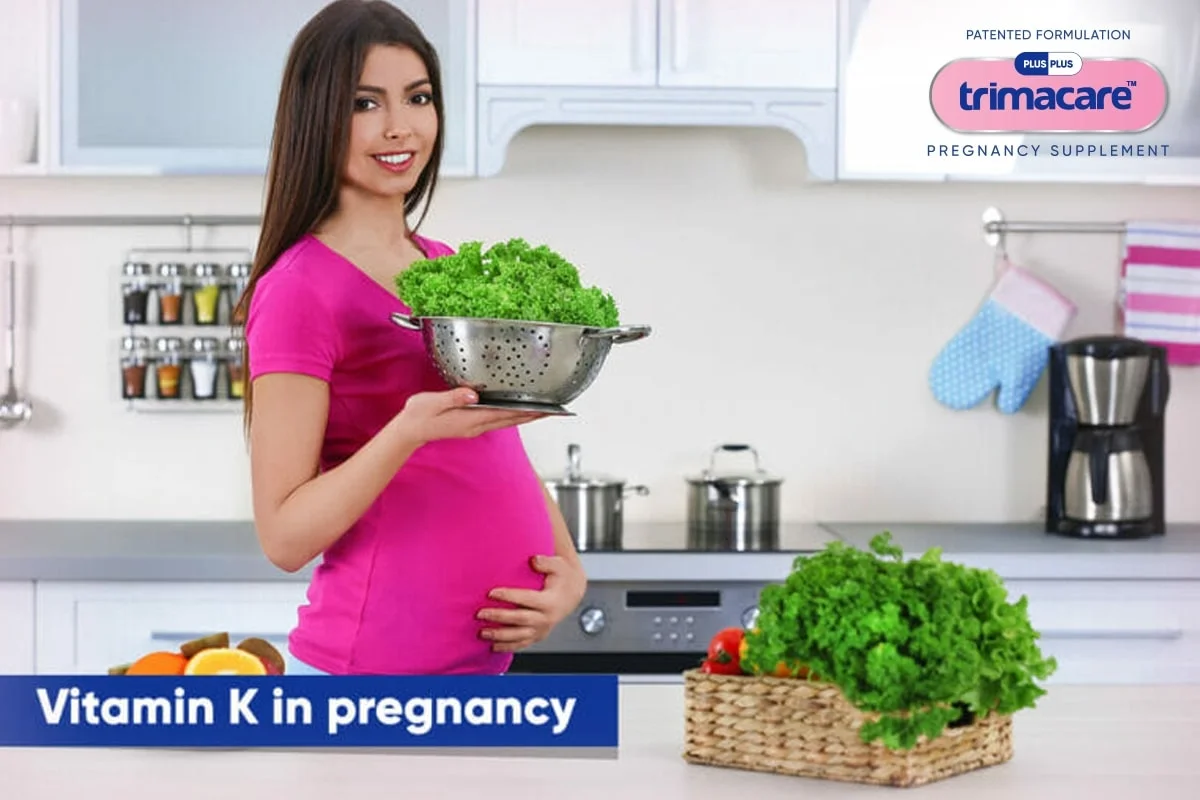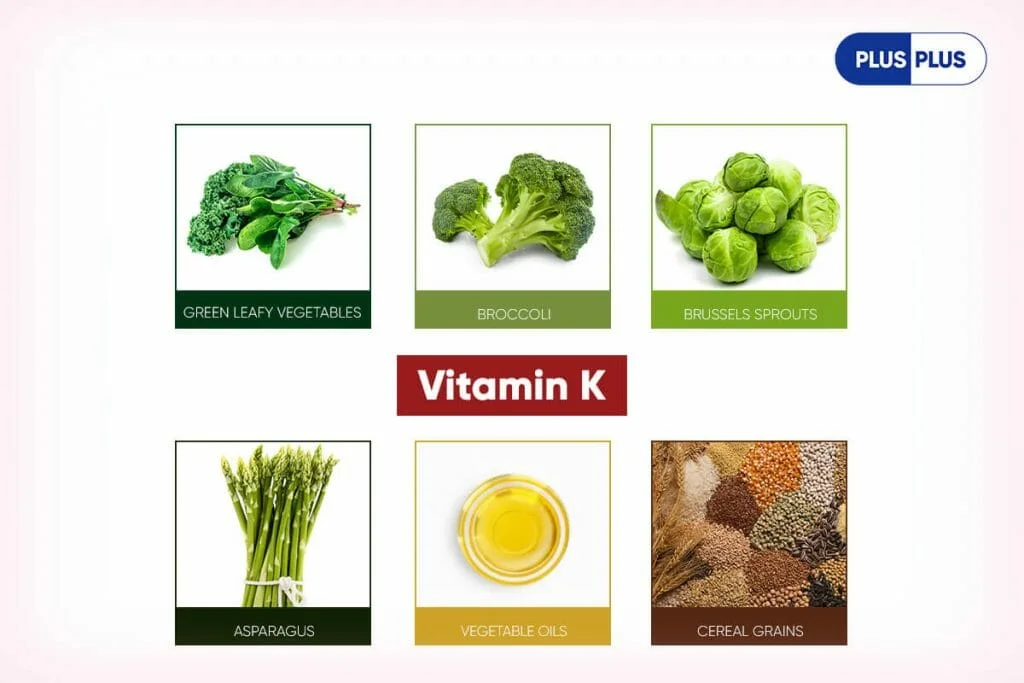Pregnancy is a challenging phase that brings profound changes for the mother and baby. Throughout this period, prenatal nutrition becomes the cornerstone of foetal and maternal well-being. In the array of nutrients needed, vitamin K during pregnancy is often neglected but it plays a crucial role in maternal wellbeing.
This blog highlights the importance of Vitamin K in pregnancy, especially for Indian women and how choosing the best prenatal vitamins with Vitamin K can make a big difference in their health.
What is Vitamin K?
Vitamin K is a fat-soluble vitamin that is needed in many physiological processes. It is crucial for blood clotting and prevents excessive bleeding in pregnancy. It also helps in the metabolism of bones and the cardiovascular system, making it dispensable during pregnancy.
Types of Vitamin K:
- Vitamin K1 (Phylloquinone): It helps in blood clotting. It is found in green leafy vegetables.
- Vitamin K2 (Menaquinone): Fermented foods and animal foods are good sources of vitamin K2. This vitamin K helps in maintaining bone and heart health.
Natural Sources of Vitamin K
Some natural sources of vitamin K are as follows-
- Spinach, broccoli, methi (fenugreek), mustard, green vegetables, cabbage and okra
- Dairy products- Cheese, eggs, chicken, liver
- Fermented foods such as natto and curd
How Vitamin K Functions in the Body?
Vitamin K activates proteins needed for blood clotting in pregnancy, helps mineralization of bones by controlling calcium, and even prevents placenta health by linking it directly to fetal growth.
Role of Vitamin K during Pregnancy
- Prevention of hemorrhage and blood Clotting
The role of Vitamin K during pregnancy mainly revolves around synthesizing prothrombin, a protein that is important for blood clotting. This reduces the risk of hemorrhage during delivery to the baby and mother.
- Bone and Fetal Development
Vitamin K also supports osteocalcin synthesis, a protein vital for binding calcium in bones, important for the development of the baby’s bones.
- Placental Health and Nutrient Transport
Accurate levels of Vitamin K ensure healthy blood vessels within the placenta, increasing nutrient and oxygen transfer to the fetus.
Vitamin K Deficiency During Pregnancy
Causes of Deficiency Among Indian Women
- Vegetarian diets with a high prevalence of Vitamin K2 deficiency
- Over-boiling and frying cooking methods that result in nutrient loss
- Gastrointestinal diseases that hinder fat absorption
Risks Linked to Vitamin K Deficiency
Vitamin K deficiency during pregnancy may result in severe complications including abnormal bleeding at the time of delivery, decreased bone density, and dysfunction of the placenta.
Vitamin K for Newborn Baby
Prevention of Vitamin K Deficiency Bleeding (VKDB)
Infants are born with low stores of Vitamin K and are susceptible to VKDB, which is a severe condition that leads to internal bleeding.
Why Babies Receive Vitamin K Shots at Birth?
To avoid VKDB, Vitamin K newborn injection is given shortly after delivery, as pediatric associations globally recommend.
Breastfeeding and Vitamin K Levels
Breastmilk has a natural low Vitamin K. Therefore, even babies who are breastfed require prophylactic Vitamin K injections.
How Much Vitamin K Do Pregnant Women Need?
Recommended Daily Intake (RDI)
In adults, including pregnant women, the RDI is around 90 micrograms daily.
Pregnancy-Specific Dosage for Indian Women
Because of differences in diet, absorption, and regular occurrence of mild anemia or gastroenteritis in India, physicians may prescribe slightly modified intakes.
Doctor’s Guidelines and Blood Tests
Regular prenatal check-ups may include coagulation tests to verify Vitamin K adequacy, particularly near delivery.
Indian Nutrition and Vitamin K Rich Foods Intake
Vitamin K-Rich Indian Foods
- Green leafy greens: Palak (spinach), methi, sarson (mustard leaves)
- Broccoli, green beans, okra
- Dairy foods, paneer, curd
Vegetarian vs. Non-Vegetarian Diets
Vegetarians rely primarily on Vitamin K1, whereas non-vegetarians get additional Vitamin K2 from meat and dairy. A well- planned Indian vegetarian diet is still possible to achieve the requirements but it needs variety.
Cooking Techniques and Nutrient Loss
Avoid boiling or frying excessively. Steaming or sautéing lightly should be employed to retain Vitamin K.
Why Indian Pregnant Women Are at Higher Risk?
Cultural Dietary Patterns
Most Indian meals are overcooked, which lowers the nutrient content. Also, fasting habits may affect regular intake.
Late Prenatal Supplementation
Usually, prenatal care starts during the second trimester, postponing essential nutrient consumption.
Common Pregnancy-Related Health Conditions in India
Prevalent anemia and infection of the gut also disrupt absorption of fats further by lowering Vitamin K consumption.
How Trimacare Supports Vitamin K Requirements?
Balanced and Bioavailable Formats
Trimacare pregnancy supplement provides Vitamin K in combination with required fats and co-factors for improved absorption.
Total Nutritional Care
In addition to Vitamin K, it contains iron, folate, B-complex, Omega-3, and antioxidants — making it one of the best prenatal vitamins available in India.
Ease of Digestion and Adherence
Its easy-on-stomach design makes it convenient for daily consumption, even for nauseous mothers.
Therefore, Trimacare is a Vitamin K supplement trusted by leading doctors in India.
Natural vs. Supplement Sources of Vitamin K
When Food Isn’t Enough
Considering cooking loss and absorption issues, the pairing of diet with safe vitamin supplements for pregnancy becomes indispensable.
Why Pair Both
A synergistic combination — consuming Vitamin K rich foods in India and prenatal supplements — assures healthy mother and baby.
Safety and Precautions
Can Too Much Vitamin K Harm You?
Excess from natural foods is rare. However, stick to doctor-recommended doses of supplements.
What to Avoid During Supplementation
Avoid self-medication with high-dose Vitamin K without professional advice, especially if you’re on anticoagulants.
Consultation with Your Gynaecologist
Always personalize your plan. Doctors may adjust dosages based on blood coagulation tests.
Myths Around Vitamin K in Pregnancy
“You need only iron and folic acid” — Not true. Vitamin K is also crucial for clotting and bone formation.
Vitamin K newborn injection myths — this is a life-saving and internationally accepted practice.
Expert Opinions
What Indian Physicians and Gynaecologists Say?
They reiterate early and complete prenatal nutrition, highlighting why Vitamin K is essential during pregnancy.
Government of India Guidelines
Government programs of the Indian government for reproductive health include nutritional counselling on balanced diets containing all the essential vitamins.
WHO and ICMR Recommendations
WHO and ICMR support overall prenatal nutrition involving vitamins such as A, D, E, and Vitamin K for pregnant women.
Conclusion
In short, Vitamin K in pregnancy is a must-have — protecting mothers from haemorrhage, helping fetal bone development, and maintaining a healthy placenta. For women in India, blending Vitamin K containing foods with reliable supplements such as Trimacare, being the best prenatal vitamin in India is the wisest approach to ensure maternal and infant health while pregnant.
FAQs
Does Trimacare contain sufficient Vitamin K for my baby?
Yes, every level of Trimacare 1, 2, 3 is designed with meticulous care to accommodate changing requirements, including Vitamin K.
Why is Vitamin K important for pregnant women in India?
Vitamin K in pregnancy is important for blood clotting, preventing excessive bleeding during childbirth. It promotes bone development for the baby and ensures placental health. In Indian women, where vegetarian diet and cooking habits could lower Vitamin K consumption, care towards this vitamin is even more important.
In what ways does Trimacare assist with Vitamin K requirement during pregnancy?
Trimacare pregnancy supplements are trimester-specific and Indian women-friendly. They have balanced levels of Vitamin K, along with iron, folate, calcium, DHA, and antioxidants, and are designed for overall support of mother and baby. It becomes easier to fill gaps that could not be filled by diet alone.
What are the benefits of taking Vitamin K supplement while pregnant?
There are several benefits that vitamin K offers for pregnancy such as consistent blood clotting, helps in fetal bone mineralization, enhances placental function, and prevents hemorrhage. It also supports reserves that benefit your infant until he/she gets their Vitamin K injection at birth.
A Certified Nutritionist with a rich healthcare background in health journalism, the author has immense experience in curating reader-friendly, engaging, and informative healthcare blogs to empower readers to make informed pregnancy-related decisions.













